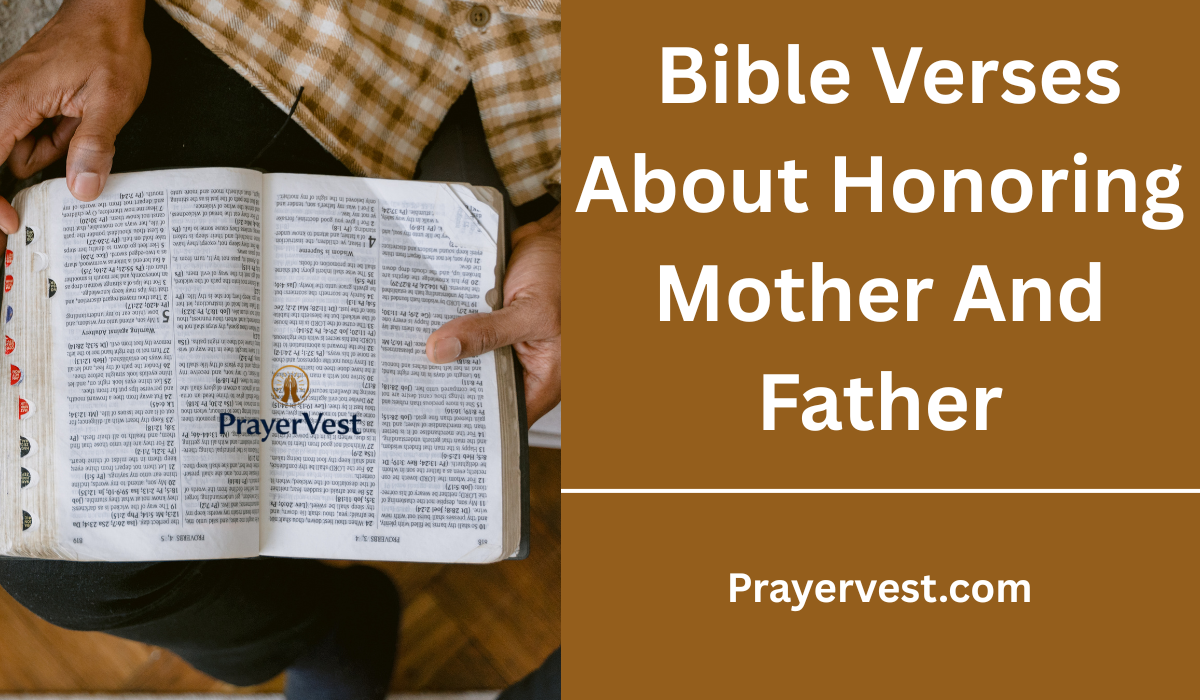A fundamental biblical command that reflects God’s plan for family connections is to honor one’s parents. This principle, which has its roots in the Ten Commandments, is a spiritual act of obedience that contains God’s promise of blessing in addition to being a moral requirement.
The Bible stresses in both the Old and New Testaments how important it is to treat parents with care, appreciation, and respect to please God. This honor is not just shown verbally; it is shown by deeds, attitudes, and a heart that recognizes the importance of parents in our lives.
The need to respect our parents may be disregarded or undervalued in today’s fast-paced and frequently individualistic society. Scripture, however, serves as a reminder that this idea is ageless and incredibly fulfilling. Even in the face of conflict, respecting parents entails listening to their advice, appreciating their sacrifices, and being polite, understanding, and patient with them.
For kids, it means being obedient and paying attention, and for adults, it entails helping elderly parents emotionally, spiritually, and occasionally physically. According to the biblical model, we should see this duty as a chance to show Christ’s love in our families rather than as a burden.


Bible passages about respecting parents are potent reminders of how much God loves intergenerational harmony and familial ties. These verses encourage believers to deepen their bonds with their parents and cultivate a loving, modest, and caring environment in the home. They also emphasize the benefits of respecting parents, which extend beyond the individual to the family and community at large. Examining these verses reveals that paying respect to our parents is a form of worship that deepens our relationship with God and fortifies the bonds that bind society together.
40 Inspiring Bible Verses About Honoring Mother And Father (2026)
1. Exodus 20:12
“Honor your father and your mother, so that you may live long in the land the LORD your God is giving you.”
This is one of the Ten Commandments, highlighting the foundational role of honoring parents in God’s design for family and society. The command is tied to a promise—long life and blessing in the land God provides. Honoring parents involves respect, obedience, gratitude, and care throughout their lives. It is not limited to childhood but extends into adulthood as a lifelong responsibility. By honoring our parents, we reflect our reverence for God’s authority, recognizing that family relationships are sacred in His sight.
2. Leviticus 19:3
“Each of you must respect your mother and father, and you must observe my Sabbaths. I am the LORD your God.”
In this verse, God pairs respect for parents with the observance of the Sabbath, placing both as integral to covenant faithfulness. This reveals that honoring parents is not merely a cultural value but a divine command linked to worship and obedience to God. Respecting parents means treating them with dignity, listening to their guidance, and showing them the love they deserve. Just as the Sabbath is set apart as holy, the role of parents is set apart as sacred, deserving of intentional honor and respect.
3. Proverbs 1:8-9
“Listen, my son, to your father’s instruction and do not forsake your mother’s teaching. They are a garland to grace your head and a chain to adorn your neck.”
These verses illustrate the beauty and value of parental wisdom. The imagery of a garland and chain symbolizes honor, beauty, and life enrichment that comes from heeding a parent’s guidance. God calls children to treasure the words of their parents as priceless adornments, not burdensome rules. By listening and applying their instruction, children position themselves for success, blessing, and favor. Parental counsel, grounded in godly principles, becomes a lifelong source of direction and moral strength.
4. Deuteronomy 5:16
“Honor your father and your mother, as the LORD your God has commanded you, so that you may live long and that it may go well with you in the land the LORD your God is giving you.”
This restatement of the commandment in Deuteronomy adds an important detail—honoring parents leads not only to long life but also to well-being. God links family honor to societal stability and personal blessing. The verse reminds us that when respect and care for parents are woven into the fabric of a community, peace and prosperity naturally follow. Honoring parents, therefore, is not just about obedience; it is about aligning with God’s order for a flourishing life.
5. Proverbs 6:20-22
“My son, keep your father’s command and do not forsake your mother’s teaching. Bind them always on your heart; fasten them around your neck. When you walk, they will guide you; when you sleep, they will watch over you; when you awake, they will speak to you.”
This passage shows how deeply parental guidance should be internalized—kept in the heart and worn like a treasured ornament. Godly parental counsel is more than advice; it is a spiritual safeguard that protects, directs, and comforts throughout life. The words of a father and mother, rooted in God’s wisdom, remain a constant presence, shaping decisions and guarding against destructive paths. Honoring parents means valuing their words enough to live by them daily.
6. Proverbs 23:22
“Listen to your father, who gave you life, and do not despise your mother when she is old.”
This verse calls for lifelong respect—acknowledging a father’s role in giving life and showing enduring honor to a mother in her later years. It speaks against the tendency to disregard parental wisdom as we grow older or when our parents become frail. Honoring parents in old age means providing care, showing patience, and continuing to value their presence and voice. In God’s eyes, the worth of a parent never diminishes with time, and our respect for them should not either.
7. Ephesians 6:1-3
“Children, obey your parents in the Lord, for this is right. ‘Honor your father and mother’—which is the first commandment with a promise—‘so that it may go well with you and that you may enjoy long life on the earth.’”
The Apostle Paul reiterates the Old Testament command, affirming that obedience and honor toward parents are acts of righteousness. This obedience is “in the Lord,” meaning it aligns with God’s will and truth. The promise of well-being and long life remains as relevant in the New Testament as it was in the Old. Honoring parents in this way reflects our obedience to God Himself, showing that family relationships are at the core of a healthy spiritual life.
8. Colossians 3:20
“Children, obey your parents in everything, for this pleases the Lord.”
Here, Paul gives a concise but powerful reminder: obeying parents is an act of worship that brings joy to God. This verse shows that honoring parents is not merely a social or cultural expectation—it is a spiritual practice that delights the heart of our Creator. Such obedience is not blind submission but a willing choice to respect the authority God has placed in our lives. When children obey, they create an environment of peace, unity, and blessing within the family.
9. Proverbs 10:1
“A wise son brings joy to his father, but a foolish son brings grief to his mother.”
This proverb highlights how a child’s actions directly affect the emotional well-being of their parents. Wisdom, expressed through godly living and good decisions, becomes a source of joy and pride for a father. Conversely, foolishness causes pain and heartache, particularly to a mother’s nurturing heart. Honoring parents means living in a way that uplifts and gladdens them, showing appreciation for their sacrifices through our conduct.
10. Proverbs 15:20
“A wise son brings joy to his father, but a foolish man despises his mother.”
This verse echoes the sentiment of Proverbs 10:1 but intensifies it by stating that foolishness is a form of contempt toward one’s mother. Disregarding parental wisdom is not neutral—it communicates dishonor and disrespect. True honor involves attentiveness, gratitude, and wise living that reflects positively on our upbringing. Our choices speak volumes about the value we place on the love and guidance of our parents.
11. Proverbs 20:20
“If someone curses their father or mother, their lamp will be snuffed out in pitch darkness.”
The imagery here is stark and sobering. Speaking ill or showing contempt toward one’s parents invites severe consequences—symbolized by a lamp being extinguished. In biblical times, a lamp represented life, guidance, and hope. To dishonor parents is to reject the God-given light they provide, leading to darkness in life. This verse warns that dishonor leads to spiritual loss and brokenness.
12. Proverbs 23:24-25
“The father of a righteous child has great joy; a man who fathers a wise son rejoices in him. May your father and mother rejoice; may she who gave you birth be joyful!”
These verses portray the deep joy that comes to parents when their children walk in righteousness and wisdom. Honoring parents includes living in a way that brings them gladness and thanksgiving to God. Our obedience, integrity, and faithfulness are not only personal virtues—they are gifts that fill our parents’ hearts with joy. Honoring them is as much about our character as it is about our words or actions.
13. Proverbs 30:17
“The eye that mocks a father, that scorns an aged mother, will be pecked out by the ravens of the valley, will be eaten by the vultures.”
This vivid proverb uses strong imagery to emphasize the seriousness of dishonoring parents. Mocking or scorning them is portrayed as a sin that invites destruction. In ancient culture, birds consuming a body symbolized shame and judgment. This verse serves as a warning that dishonor leads to disgrace and ruin, while honor leads to blessing and dignity.
14. Matthew 15:4
“For God said, ‘Honor your father and mother’ and ‘Anyone who curses their father or mother is to be put to death.’”
Here, Jesus affirms the Old Testament command while confronting the hypocrisy of religious leaders who neglected it. He emphasizes that God takes honoring parents seriously, equating the act of cursing them with a capital offense under the Law. The verse calls believers to uphold this command as a non-negotiable part of faithful living, not merely as a cultural tradition.
15. Mark 7:10
“For Moses said, ‘Honor your father and mother,’ and, ‘Anyone who curses their father or mother is to be put to death.’”
Mark’s Gospel echoes Matthew 15:4, reinforcing the seriousness with which God regards this command. Jesus exposes the tendency to bypass this duty through man-made traditions. Honoring parents is not optional or subject to personal interpretation—it is a direct command from God that reflects our heart’s obedience to Him.
16. Luke 2:51
“Then he went down to Nazareth with them and was obedient to them. But his mother treasured all these things in her heart.”
This verse speaks of Jesus Himself submitting to His earthly parents, Mary and Joseph, despite being the Son of God. His obedience models perfect humility and respect, showing that honoring parents is a virtue even for the most exalted. Mary’s treasuring of these moments reflects the deep joy that comes when children walk in obedience and honor toward their parents.
17. John 19:26-27
“When Jesus saw his mother there, and the disciple whom he loved standing nearby, he said to her, ‘Woman, here is your son,’ and to the disciple, ‘Here is your mother.’ From that time on, this disciple took her into his home.”
Even in His final moments on the cross, Jesus ensured that His mother was cared for. This powerful scene illustrates that honoring parents includes providing for their needs, especially in old age or times of vulnerability. Jesus’ act sets an eternal example of filial love and responsibility.
18. 1 Timothy 5:4
“But if a widow has children or grandchildren, these should learn first of all to put their religion into practice by caring for their own family and so repaying their parents and grandparents, for this is pleasing to God.”
Paul teaches that caring for aging parents and grandparents is not just a good deed—it is a spiritual duty and an expression of genuine faith. Providing for them is a way of repaying the love, sacrifice, and care they poured into our lives. This kind of honor brings delight to God.
19. 1 Timothy 5:8
“Anyone who does not provide for their relatives, and especially for their own household, has denied the faith and is worse than an unbeliever.”
Failing to care for one’s family, including parents, is described here as a denial of faith. The verse underscores that love and provision for family are core expressions of Christian living. Honoring parents means ensuring their well-being, not neglecting them.
20. Hebrews 12:9
“Moreover, we have all had human fathers who disciplined us and we respected them for it. How much more should we submit to the Father of spirits and live!”
This verse acknowledges the respect we owe to earthly parents for their discipline and guidance. If we can honor and value their instruction, how much more should we honor our heavenly Father? The comparison reinforces the link between parental honor and spiritual submission.
21. Ruth 1:16-17
“But Ruth replied, ‘Don’t urge me to leave you or to turn back from you. Where you go I will go, and where you stay I will stay. Your people will be my people and your God my God. Where you die I will die, and there I will be buried.’”
Although this is between a daughter-in-law and her mother-in-law, Ruth’s unwavering commitment mirrors the heart of honoring parental figures. She pledges loyalty, care, and shared faith, demonstrating love and respect that goes beyond obligation.
22. Genesis 47:11-12
“So Joseph settled his father and his brothers in Egypt and gave them property in the best part of the land, the district of Rameses, as Pharaoh directed. Joseph also provided his father and his brothers and all his father’s household with food, according to the number of their children.”
Joseph’s care for his father Jacob during the famine shows the practical side of honoring parents—ensuring their physical needs are met. He didn’t just provide the bare minimum; he gave them the best. Honoring means offering our parents dignity, comfort, and security.
23. 1 Kings 2:19
“When Bathsheba went to King Solomon to speak to him for Adonijah, the king stood up to meet her, bowed down to her and sat down on his throne. He had a throne brought for the king’s mother, and she sat down at his right hand.”
Solomon’s respectful treatment of his mother Bathsheba—bowing before her and giving her a place of honor—shows how respect is expressed publicly. Honoring parents includes esteeming them in the presence of others, not just in private.
24. Jeremiah 35:18-19
“Then Jeremiah said to the family of the Rekabites, ‘This is what the LORD Almighty, the God of Israel, says: “You have obeyed the command of your forefather Jehonadab and have followed all his instructions and have done everything he ordered.” Therefore this is what the LORD Almighty, the God of Israel, says: “Jehonadab son of Rekab will never fail to have a descendant to serve me.”’”
The Rekabites’ faithfulness to their ancestors’ instructions brought them divine blessing. This shows that honoring parental and ancestral guidance, especially when it aligns with God’s will, can bring generational favor.
25. Deuteronomy 27:16
“Cursed is anyone who dishonors their father or mother.” Then all the people shall say, “Amen!”
This verse underscores the seriousness of dishonoring parents by placing it under God’s curse. In Israel’s covenant community, such disrespect was not tolerated because it undermined the family structure God established. Honoring parents is not just a moral suggestion—it’s a covenant obligation with spiritual consequences.
26. Matthew 19:19
“Honor your father and mother” and “love your neighbor as yourself.”
Jesus links honoring parents directly with loving others, placing family respect alongside the broader command to love one’s neighbor. This shows that honoring parents is an expression of the love God calls us to live out daily.
27. Mark 10:19
“You know the commandments: ‘Do not murder, do not commit adultery, do not steal, do not give false testimony, do not defraud, honor your father and mother.’”
Here, Jesus reaffirms the timeless relevance of honoring parents as part of living righteously. It’s placed among the foundational moral laws, reminding us that family respect is essential to God’s moral order.
28. Luke 18:20
“You know the commandments: ‘You shall not commit adultery, you shall not murder, you shall not steal, you shall not give false testimony, honor your father and mother.’”
Luke records Jesus repeating the command to honor parents, showing that this principle is consistently affirmed in the Gospels. Family honor remains a central expression of obedience to God’s law.
29. Leviticus 20:9
“Anyone who curses their father or mother is to be put to death. Because they have cursed their father or mother, their blood will be on their own head.”
The severity of this Old Testament law reflects how deeply God values family respect. While the civil penalty no longer applies under the new covenant, the moral weight of this command remains.
30. 2 Chronicles 34:27
“Because your heart was responsive and you humbled yourself before God when you heard what he spoke against this place and its people, and because you humbled yourself before me and tore your robes and wept in my presence, I have heard you,” declares the LORD.
Although directed at King Josiah, this verse reflects the humility and responsiveness God desires—traits also seen when we honor our parents’ instruction. A tender heart toward authority, whether divine or parental, brings God’s favor.
31. Genesis 28:7
“And that Jacob had obeyed his father and mother and had gone to Paddan Aram.”
Jacob’s obedience to his parents’ instruction shows that honoring them includes following their godly guidance, even when it involves sacrifice or leaving comfort zones.
32. Genesis 46:29
“Joseph had his chariot made ready and went to Goshen to meet his father Israel. As soon as Joseph appeared before him, he threw his arms around his father and wept for a long time.”
Joseph’s emotional reunion with his father Jacob reveals the deep affection and honor that mark a godly parent-child relationship. Honor includes love, respect, and cherishing moments together.
33. Exodus 18:7
“So Moses went out to meet his father-in-law and bowed down and kissed him. They greeted each other and then went into the tent.”
Moses’ respectful greeting to his father-in-law Jethro models how honor extends to parental figures and elders beyond our biological parents. Respect is shown in humility and a warm reception.
34. Jeremiah 29:7
“Also, seek the peace and prosperity of the city to which I have carried you into exile. Pray to the LORD for it, because if it prospers, you too will prosper.”
Though about community life, this verse parallels honoring parents—when we work for the peace and prosperity of our family, we too are blessed. Family well-being brings personal well-being.
35. Philippians 2:3-4
“Do nothing out of selfish ambition or vain conceit. Rather, in humility value others above yourselves, not looking to your own interests but each of you to the interests of the others.”
Paul’s instruction applies powerfully to family life. Honoring parents means putting their needs and dignity before our own, practicing selflessness and humility in our interactions.
36. 1 Peter 5:5
“In the same way, you who are younger, submit yourselves to your elders. All of you, clothe yourselves with humility toward one another, because, ‘God opposes the proud but shows favor to the humble.’”
Submission to elders is a principle of respect that applies directly to honoring parents. Humility opens the door to God’s blessing, while pride hinders relationships.
37. 2 Timothy 1:5
“I am reminded of your sincere faith, which first lived in your grandmother Lois and in your mother Eunice and, I am persuaded, now lives in you also.”
This verse celebrates the spiritual heritage passed down from mother to child. Honoring parents includes cherishing and carrying forward the faith they have instilled in us.
38. Psalm 103:17-18
“But from everlasting to everlasting the LORD’s love is with those who fear him, and his righteousness with their children’s children— with those who keep his covenant and remember to obey his precepts.”
Generational blessing flows when we walk in God’s ways and honor our parents. Our respect for them becomes part of a spiritual legacy for future generations.
39. Titus 2:3-5
“Likewise, teach the older women to be reverent in the way they live, not to be slanderers or addicted to much wine, but to teach what is good. Then they can urge the younger women to love their husbands and children, to be self-controlled and pure, to be busy at home, to be kind, and to be subject to their husbands, so that no one will malign the word of God.”
This passage shows how generational teaching and respect sustain a godly family order. Honoring parents means learning from their wisdom and passing it on to the next generation.
40. Psalm 128:1-2
“Blessed are all who fear the LORD, who walk in obedience to him. You will eat the fruit of your labor; blessings and prosperity will be yours.”
A life lived in obedience to God—starting with honoring parents—brings blessing and abundance. When we respect the order God has set, we enjoy the fruit of peace, provision, and joy in our families.
Conclusion
In summary, honoring our parents is a divine mandate that expresses God’s desire for love, respect, and family unity and goes beyond cultural customs. The Bible makes it quite evident that treating our parents with respect, thanks, and care is an act of obedience to God and a means of receiving blessings. Our respect for our parents becomes an outward manifestation of our faith, whether it be through friendly remarks, deeds of service, or just patient listening. It reinforces the ties that bind families together and recognizes their divinely appointed role in our lives.
In the end, honoring our parents is a lifelong commitment that is independent of age or situation. It manifests as compliance and attentiveness in children and frequently entails advocacy, support, and compassion in adults. In addition to blessing our parents, we honor God and provide a model for the next generation by putting the wisdom of Scripture into practice. Honoring parents is a potent sign of faith, love, and obedience to God’s Word in a society where family values are frequently questioned.






